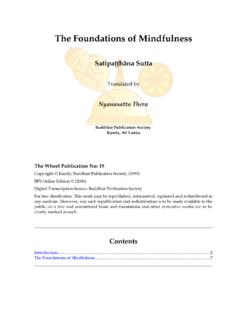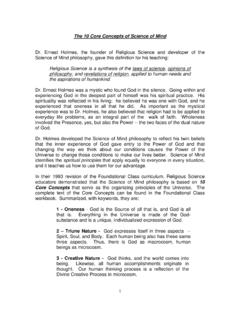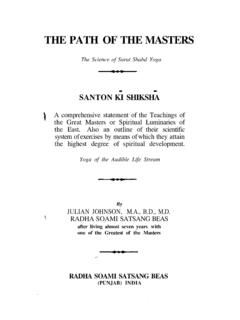Transcription of Gayatri Chakravorty Spivak Can the Subaltern Speak?
1 Gayatri Chakravorty Spivak Can the Subaltern Speak? An understanding of contemporary relations of power, and of the Western intellectual's role within them, re-quires an examination of the intersection of a theory of representation and the political economy of global capi-talism. A theory of representation points, on the one hand, to the domain of ideology, meaning, and subjec-tivity, and, on the other hand, to the domain of politics, the state, and the law. The original title of this paper was "Power, Desire, Interest."1 Indeed, whatever power these meditations command may have been earned by a politically interested refusal to push to the limit the found-ing presuppositions of my desires, as far as they are within my grasp. This vulgar three-stroke formula, applied both to the most resolutely committed and to the most ironic discourse, keeps track of what Althusser so aptly named "philosophies of denegation.
2 "2 I have invoked my positionality in this awkward way so as to accentuate the fact that calling the place of the investigator into question remains a meaningless piety in many recent cri-tiques of the sovereign subject. Thus, although I will attempt to foreground the precariousness of my position throughout, I know such gestures can never suffice. This paper will move, by a necessarily circuitous route, from a critique of current Western efforts to problematize the subject to the question oflllgw the third-world subject is represented within Western dis-course. Along the way, I will have occasion to suggest that a still more radical decentering of the subject is, in fact, implicit in both Marx and Derrida. And I will have recourse, perhaps surprisingly, to an argument that Western intellectual production is, in many ways, complicit with Western international economic interests.
3 In the end, I will offer an alternative anal-ysis of the relations between the discourses of the West and the possibility of speaking of (or for) the Subaltern woman. I will draw my specific examples from the case of India, discussing at length the extraordinarily paradoxical status of the British abolition of widow sacrifice. I Some of the most radical criticism coming out of the West today is the result of an interested desire to conserve the subject of the West, or the West as SUbject. The theory of pluralized "subject-effects" gives an illusion of undermining SUbjective sovereignty while often provid-ing a cover for this subject of knowledge. Although the history of Europe as Subject is narrativized by the law, political economy, and ideology of the West, this concealed Subject pretends it has "no geo-political determina-271 tions.
4 " The much-publicized critique of the sovereign subject thus actually inaugurates a Subject. I will argue for this conclusion by considering a text by two great practitioners of the critique: "Intellectuals and Power: A Con-versation between michel foucault and Gilles Deleuze. "3 I have chosen this friendly exchange between two activist phi-losophers of history because it undoes the opposition between authoritative theoretical production and the unguarded practice of conversation, enabling one to glimpse the track of ideology. The participants in this conversation emphasize the most important contributions of French poststructuralist the-ory: first, that the networks of power/desire/interest are so heterogeneous that their reduction to a coherent narrative is counterproductive-a per-sistent critique is needed; and second, that intellectuals must attempt to disclose and know the discourse of society's Other.
5 Yet the two systemat-ically ignore the question of ideology and their own implication in intel-lectual and economic history. Although one of its chief presuppositions is the critique of the sovereign subject, the conversation between foucault and Deleuze is framed by two monolithic and anonymous subjects-in-revolution: "A Maoist" (FD, 205) and "the workers' struggle" (FD, 217). Intellectuals, however, are named and differentiated; moreover, a Chinese Maoism is nowhere operative. Maoism here simply creates an aura of narrative specificity, which would be a harmless rhetorical banality were it not that the innocent appropriation of the proper name "Maoism" for the eccentric phenomenon of French intellectual "Maoism" and subsequent "New Philosophy" symptomatically renders "Asia" Deleuze's reference to the workers' struggle is equally proble-matic; it is obviously a genuflection: "We are unable to touch [power] in any point of its application without finding ourselves confronted by this diffuse mass, so that we are necessarily led.
6 To the desire to blow it up completely. Every partial revolutionary attack or defense is linked in this way to the workers' struggle" (FD, 217). The apparent banality signals a disavowal. The statement ignores the international division of labor, a ges-ture that often marks poststructuralist political The invocation of the workers' struggle is baleful in its very innocence; it is incapable of dealing with global capitalism: the sUbject-production of worker and unemployed within nation-state ideologies in its Center; the increasing subtraction of the working class in the Periphery from the realization of surplus value and thus from "humanistic" training in consumerism; and the large-scale pres-ence of paracapitalist labor as well as the heterogeneous structural status of agriculture in the Periphery.
7 Ignoring the international division of labor; rendering "Asia" (and on occasion "Africa") transparent (unless the subject is ostensibly the "Third World"); reestablishing the legal subject of socialized capital-these are problems as common to much poststructuralist as to struc-turalist theory. Why should such occlusions be sanctioned in precisely those intellectuals who are our best prophets of heterogeneity and the Other? The link to the workers' struggle is located in the desire to blow up power at any point of its application. This site is apparently based on a simple valorization of any desire destructive of any power. Walter Benjamin comments on Baudelaire's comparable politics by way of quotations from Marx: 272 Gayatri Chakravorty Spivak Marx continues in his description of the conspirateurs de profession as follows: ".
8 They have no other aim but the immediate one of overthrowing the existing government, and they profoundly despise the more theoretical enlightenment of the workers as to their class interests. Thus their anger-not proletarian but plebian-at the habits noirs (black coats), the more or less educated people who represent [vertretenjthat side of the movement and of whom they can never become entirely independent, as they cannot of the official rep-resentatives [Reprasentantenj of the party." Baude-laire's political insights do not go fundamentally be-yond the insights of these professional conspirators .. He could perhaps have made Flaubert's statement, "Of all of politics I understand only one thing: the revolt," his The link to the workers' struggle is located, simply, in desire.]]
9 Elsewhere, Deleuze and Guattari have attempted an alternative definition of desire, revising the one offered by psychoanalysis: "Desire does not lack anything; it does not lack its object. It is, rather, the subject that is lacking in desire, or desire that lacks a fixed subject; there is no fixed subject except by repression. Desire and its object are a unity: it is the machine, as a machine of a machine. Desire is machine, the object of desire also a con-nected machine, so that the product is lifted from the process of producing, and something detaches itself from producing to product and gives a leftover to the vagabond, nomad subject."7 This definition does not alter the specificity of the desiring subject (or leftover subject-effect) that attaches to specific instances of desire or to production of the desiring machine.
10 Moreover, when the connection be-tween desire and the subject is taken as irrelevant or merely reversed, the subject-effect that surreptitiously emerges is much like the generalized ide-ological subject of the theorist. This may be the legal subject of socialized capital, neither labor nor management, holding a "strong" passport, using a "strong" or "hard" currency, with supposedly unquestioned access to due process. It is certainly not the desiring subject as Other. The failure of Deleuze and Guattari to consider the relations between desire, power, and subjectivity renders them incapable of articu-lating a theory of interests. In this context, their indifference to ideology (a theory of which is necessary for an understanding of interests) is striking but consistent.















